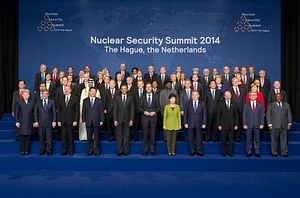This week, on the sidelines of the Nuclear Security Summit in The Hague, Netherlands, U.S. President Barack Obama, South Korean President Park Geun-hye, and Japanese Prime Minister Shinzo Abe met in a trilateral setting to discuss regional security. The meeting marks the first official high-level meeting between Park Geun-hye and Shinzo Abe and comes at a time when relations between Japan and South Korea are strained by the legacy of Japan’s imperial past.
The trilateral summit is a result of the ongoing effort by Washington to ease the tensions between its two allies in northeast Asia. Traditionally, the United States has avoided mediating between South Korea and Japan over their disagreements (including a territorial dispute over the Dokdo/Takeshima islands). However, the distance between Abe and Park is more pronounced than any pair of leaders in Japan and South Korea in recent memory. Shinzo Abe’s right wing rhetoric and interest in revising Japan’s post-World War II “peace constitution” has earned him the scorn of his neighbors. Mistrust of Abe is not only reserved to the South Korean leader; public opinion in South Korea is squarely opposed to Abe as well – even the despised North Korean dictator Kim Jong-un is viewed more favorably than Abe.
In an effort to avoid pitching the meeting as an attempt at mediating between allies, the agenda focused on the regional threat posed by North Korea, which made its presence felt at the Nuclear Security Summit by conducting a ballistic missile test using some of the longest range missiles since 2012. The test of the Rodong-class (Nodong) missiles help underscore the necessity for cooperation between the United States, South Korea, and Japan.
In an official statement following the trilateral, Obama noted that “close coordination between our three countries has succeeded in changing the game with North Korea, and our trilateral cooperation has sent a strong signal to Pyongyang that its provocations and threats will be met with a unified response and that the U.S. commitment to the security of both Japan and the Republic of Korea is unwavering, and that a nuclear North Korea is unacceptable.” Continuing this cooperation was laid out as one of the objectives of the trilateral meeting. Obama expressed an interest in building on the meeting in Seoul and Tokyo when he visits Asia next month.
The trilateral was ultimately a limited exchange of opinions and everything that was said was likely predictable for everybody present. The meeting was a success in the sense that it got Abe and Park to share a room together and meet for the first time. Abe even noted that he was “so very happy to be able to see President Park Geun-Hye.” Park did not acknowledge any reaction to seeing Abe for the first time in their official capacities, according to the official statement released by the White House.
This trilateral was necessary ahead of Obama’s upcoming trip to Asia in April where he will be meeting privately with both Abe and Park in their respective capitals. It is likely that those meetings will address the more profound disagreements that Japan and South Korea have at the moment and the importance of resolving those issues so that the three allies can focus on putting up a united front against North Korea. The process of mediating between allies can be perilously risky, but it appears that Washington is unwilling to tolerate a status quo where Japan and South Korea stand separated.

































